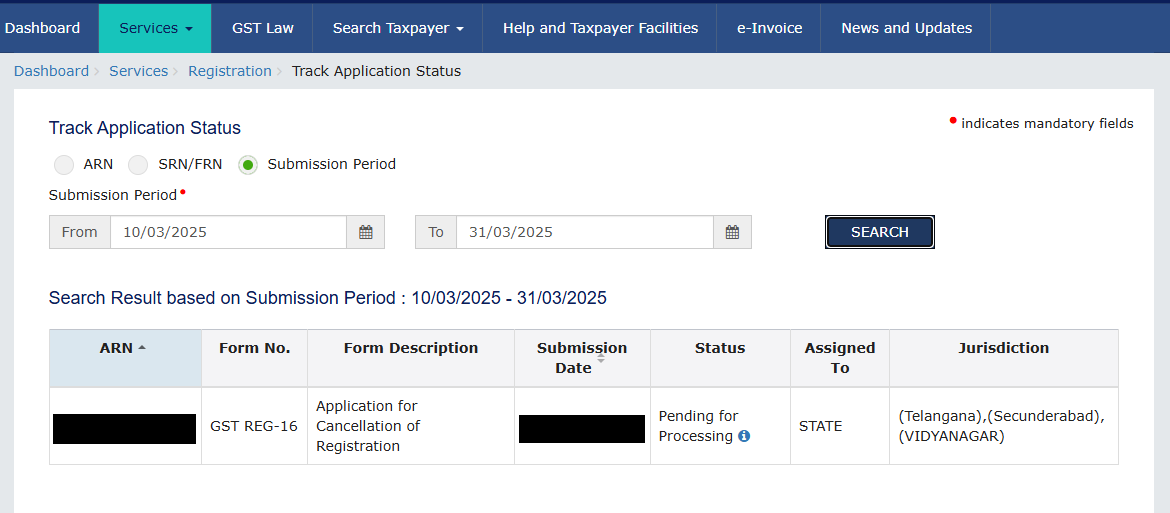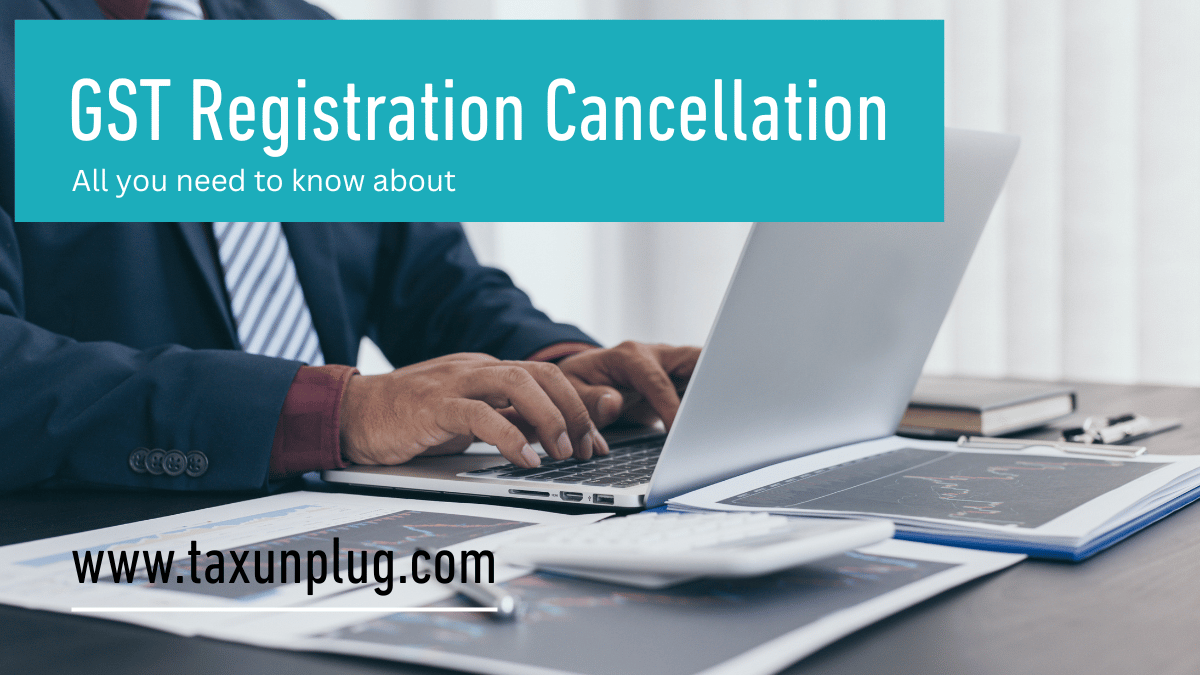GST Registration Cancellation:
The Goods and Services Tax (GST) regime has streamlined taxation in India, but there are instances when businesses need to cancel their GST registration—either voluntarily or due to regulatory requirements. Whether you’re closing your business, transitioning to a different model, or no longer meeting the GST threshold, understanding the cancellation process is crucial to avoid penalties and ensure compliance. This blog covers everything you need to know about GST registration cancellation, including reasons, required documents, step-by-step procedures, and FAQs.
What is GST Registration Cancellation?
GST registration cancellation refers to the process where a registered taxpayer’s GST number is deactivated. This can happen:
- Voluntarily by the taxpayer (e.g., business closure).
- By the GST department due to non-compliance, fraud, or inactivity.
Once canceled, the taxpayer is no longer liable to collect or pay GST.
Reason for Cancellation of GST Registration
There are several reasons why a business may choose to cancel its GST registration, including:
- The business is no longer operational: If a business has closed down or sold or is no longer providing taxable supplies, it may no longer be required to register for GST.
- The business no longer meets the criteria for mandatory registration: Depending on the jurisdiction, there may be certain criteria that a business must meet in order to be required to register for GST. If a business’s taxable turnover falls below the threshold, it may no longer be required to register.
- The business is shifting to a different business model: A business that was previously required to register for GST may no longer be required to do so if it shifts to a different business model.
- Change in Business Nature: If the business is merging or acquiring another business: If a business is merging with or acquiring another business, it may no longer be required to register for GST.
- Voluntary Cancellation: Taxpayers who no longer wish to continue their GST registration may request for voluntary cancellation.
Documents required for GST Cancellation
The following documents are typically required when applying for GST cancellation:
- GST Cancellation Form: Form GST REG-16, which is used to apply for GST cancellation, has to be filled and submitted. The details about the finished and semi-finished goods should also be filed.
- PAN card of the Business: A copy of PAN card of the business
- GST Returns: Details of GST returns filed by the business till date.
- Future correspondence address: The details of future correspondence address along with proof of the address would be required.
- Stock register: Stock register for finished or semi-finished goods should be required.
- Financial Statements: Financial statements such as balance sheet, profit and loss account, etc
- NOC and KYC details from all partners or directors: KYC and No Objection Certificates from all partners or directors of the business.
- Other information: Any other relevant documents as specified by the GST department.
It’s important to note that the GST department may ask for additional documents and clarification as deemed fit. It’s also important to note that GST cancellation will only be granted if there are no outstanding tax liabilities, and all GST returns have been filed until the date of cancellation.
Process of GST cancellation
Here is the process we follow for filing a GST cancellation application
1.Prepare the application: Fill out Form GST REG-16, which is the application for GST cancellation. The form should be filled with correct information and signed by the authorized person of the business.
2. Stock Details: The details about finished and semi-finished goods held at the time of filing the application and pay the liability on held stock.

3. Tax payment of Stock: Tax can be paid by debiting electronic cash ledger or either by electronic credit ledger.

4. Submit the application: Submit the Form GST REG-16 and the required documents to the GST department through the GST Common Portal.
5. Obtain the acknowledgment: Once the application is submitted, an acknowledgment number will be generated. Keep the acknowledgment number for future reference.
6. Track the application status: Once the application is submitted, an acknowledgment number will be generated. Keep the acknowledgment number for future reference.

7. Gather the required documents: Collect all the required documents such as PAN card of the business, GST registration certificate, bank account details, GST returns filed till date, financial statements, GST Reconciliations, NOC from all partners or directors etc.
8. Department Review: The GST department will review the application and may ask about clarification or any documents.
9. Approval or Rejection: The GST department after considering the application and submitted documents, your application will be approved or rejected based on scenario. Once the application is approved, a cancellation certificate will be issued.
10. File the final returns: After the cancellation of GST registration, the business needs to file final returns.
It’s important to note that the GST department may ask for additional documents or information as deemed fit. The GST department may also call for a personal hearing or inspection of the premises of the business. It’s highly recommended to take professional help from a tax professional such as Taxunplug for GST Cancellation, as it’s a legal process and any mistake can lead to penalty or prosecution.
FAQs on of GST Registration Cancellation
Q. Can we apply for revocation of GST registration after cancellation?
A registered person can submit an application for revocation of cancellation, in FORM GST REG-21, if his registration has been cancelled suo moto by the proper officer.
Q. Can I cancel my GST registration voluntarily?
Yes, registered person under GST can voluntarily apply for GST cancellation. This is commonly done when the business discontinues its operations or if it is no longer required to maintain GST registration due to a reduction in turnover.
Q. What happens after my GST registration is canceled?
After GST registration is cancelled:
- The business will no longer have to pay GST on sales.
- You may need to reverse any unutilized input tax credit (ITC).
- A final GST return (GSTR-10) must be filed within 30 days of cancellation.
- GST invoices cannot be issued post-cancellation.
Q. What happens if I don’t file the final return after GST cancellation?
The Final return (GSTR-10) must be filed within three months from the date of cancellation or the date of the cancellation order, whichever is later. If not filed, the GST department may impose a penalty. Non-compliance could also lead to further legal action.
Q. Can GST cancellation be initiated by the GST department?
Yes, the GST department can initiate the cancellation of a GST registration if:
- Returns are not filed for a specified period.
- GST laws are violated, such as fraudulent activities.
- Input tax credit is wrongly claimed.
Q. Can a business apply for a new GST registration after cancellation?
Yes, a business can apply for a new GST registration, but the previous cancellation details should be disclosed during the application.
GST Registration Cancellation
For further assistance, you may contact Taxunplug by dropping your Name, Mobile and Email. Our team of experts will take care of all the sticky things and helps to take timely action, and ensure compliance to avoid legal complications.
The information provided in above blog is for general informational only and should not be considered as legal or tax advice. Request you to please follow latest updated in reference to above details. We advise to consult with a qualified tax professional such as “Taxunplug” for all your tax needs.

